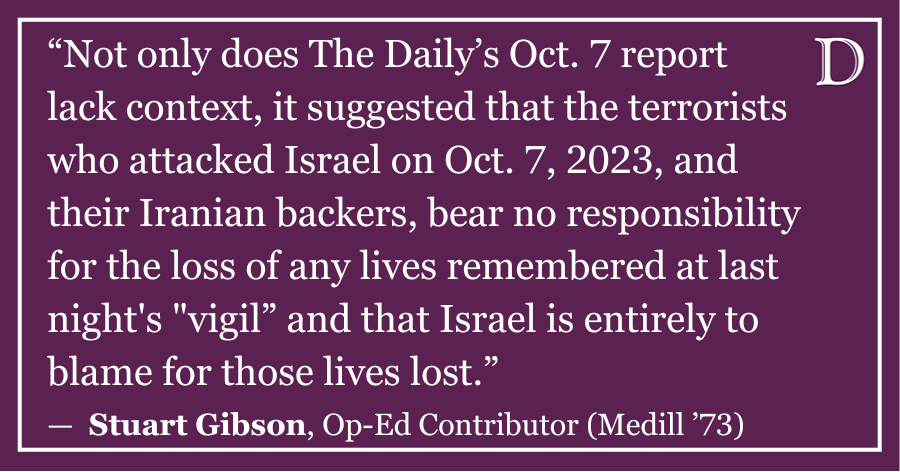This letter is in response to the “Open letter on NU leaders’ responses to war in Palestine and Israel” published in the Oct.16 edition of The Daily.
The Oct.16 letter gave the impression that the reasons civilians were killed by Hamas and by the Israel Defense Forces were the same, but whereas Hamas murdered civilians intentionally, the IDF were defending their citizens and homeland. The original 1988 Hamas charter (Covenant of the Islamic Resistance Movement) and guidelines to mosque preachers from the Palestinian Authority last week — according to Palestinian Media Watch and Jihad Watch — specifically state that Hamas’ mission is the annihilation of Jews and the complete destruction of Israel and the establishment of a theocratic state based on Islamic law. While Hamas amended its charter in 2017 to remove explicit mention of annihilation of Jews, we believe that mission is still intrinsic to their movement.
In 2005, Israel withdrew all soldiers and civilians from Gaza to reduce friction and enhance security. Two years later, Hamas violently overthrew the Palestinian Authority and took over the territory. Since then, terrorists have fired over tens of thousands of rockets indiscriminately at Israeli civilians, according to the Associated Press. This has led to multiple wars, and both Israel and Egypt needed to maintain a blockade to prevent weapons smuggling into Gaza.
On Oct. 7 Hamas members intentionally slaughtered and eviscerated civilian men, women and children — as their 1988 charter and directives to preachers demand — and they raped women, according to the IDF. In the Oct. 16 open letter, the authors say the number of rockets Israel dropped in the first week of the war exceeded how many rockets terrorists had dropped, as if it was disproportionate. Based on a rule of proportionality, which is irrelevant in war, the IDF would be justified in committing as many horrific acts against Gazans as Hamas has against Israeli citizens. This is absurd.
The IDF has said it does everything possible to avoid killing Palestinian civilians, such as forewarning civilians to move out of a particular area by dropping leaflets, putting messages on social media and making phone calls. Yet, a significant number of Palestinian civilians are still killed. Why? The Washington Post has reported Hamas hides and fires its munitions in civilian areas, including hospitals, schools and homes, and uses civilians as human shields. Because of this, the IDF has diverted missiles. The IDF has also said Hamas is responsible for blocking civilians from traveling south to what the IDF said would be a safe zone.
The open letter’s depiction of “the blockade and humanitarian stranglehold on the Gaza strip since 2007” by Israel ignores the IDF’s assertion that a blockade is necessary to prevent terrorists from entering, which occurred prior to the blockade. The blockade is a way for Israel to protect its citizens from harm.
Gaza gets hundreds of millions of dollars each year for humanitarian purposes, but much of this money does not reach the civilian population, the Wall Street Journal reported. Hamas uses it for military purposes, which contributes to poverty among civilians. Hamas was named the third richest terror group in the world by Forbes Magazine in 2018. International aid “was designed to be humanitarian in nature, but money is fungible, and that also allows Hamas to divert money from providing for its people to support the war machine,” Alex Zerden, a former senior U.S. Treasury national security official, said in the Wall Street Journal. If Hamas had used this money to build infrastructure and support businesses, Gaza would be in a much better position.
Although we grieve for the loss of all innocent lives, the loss of life is on the bloodied hands of Hamas. There are not two sides to barbaric behavior. Hamas is displaying unimaginable evil that is unacceptable in any civilized society, and there is no justification for pure evil.
Richard B. Silverman, Departments of Chemistry, Molecular Biosciences, and Pharmacology
Morton O. Schapiro, President Emeritus, Northwestern University
Henry Bienen, President Emeritus, Northwestern University
David N. Seidman, Department of Materials Science and Engineering
James A Sauls, Department of Physics and Astronomy
Philip Greenland, Department of Preventive Medicine
Harris Perlman, Department of Medicine
Raymond Glassenberg MD Department of Anesthesiology
Jonathan B Ida, Department of Otolaryngology
Richard J. Miller, Department of Pharmacology
Michael R. Wasielewski, Department of Chemistry
Rose Shoshanah Seidman, Selector and Cataloguer
J. Samuel Tenenbaum, Pritzker School of Law
Thomas Meade, Department of Chemistry and Molecular Biosciences
Brian M. Hoffman, Department of Chemistry
Lewis J. Smith, Department of Pulmonary and Critical Care Medicine
Tobin J. Marks, Department of Chemistry
Tamar Seideman, Department of Chemistry
Ben Z. Katz, Department of Pediatrics
Oren Lakser, Department of Pediatrics
Mercouri G Kanatzidis, Department of Chemistry
Julio M. Ottino, Department of Chemical and Biological Engineering
George C. Schatz, Department of Chemistry
Lee P. Shulman, Department of Obstetrics and Gynecology
P. Hande Ozdinler, Department of Neurology
Neil J. Stone, Department of Cardiology
Kenneth Poeppelmeier, Department of Chemistry
Chad A. Mirkin, Department of Chemistry
Joseph L. Schofer, Department of Civil and Environmental Engineering
Joel Shalowitz, Department of Preventive Medicine
Yohanan Petrovsky-Shtern, Department of History
William Klein, Department of Neurobiology
Milan Mrksich, Department of Chemistry and Biomedical Engineering
Gary Saul Morson, Department of Slavic Languages and Literatures
Mark C. Hersam, Department of Materials Science and Engineering
Elie Rekhess, Visiting Professor, Department of History
Samuel I. Stupp, Department of Chemistry and Materials Science and Engineering
William P. Halperin, Department of Physics and Astronomy
Efraim Benmelech, Kellogg School of Management
Joel Mokyr, Department of Economics and History
Igor Jerome Koralnik, Department of Neurology
Eddie Dekel, Department of Economics
Martin Eichenbaum, Department of Economics
William A. Muller, Department of Pathology
Lauren S. Wakschlag, Department of Medical Social Sciences
Irwin Benuck, Department of Pediatrics
Benayahu Elbaz-Eilon, Department of Neurology
If you would like to respond publicly to this op-ed, send a Letter to the Editor to [email protected]. The views expressed in this piece do not necessarily reflect the views of all staff members of The Daily Northwestern.

















